/ MEDIA STATEMENT / The content on this page is not written by Polity.org.za, but is supplied by third parties. This content does not constitute news reporting by Polity.org.za.
The Centre for Constitutional Rights (the CFCR) welcomes a judgment by the Supreme Court of Appeal (SCA) in City of Cape Town v South African National Roads Authority Limited & Others in which the Court reiterated the importance of openness as a key constitutional value in our democracy.
The matter dealt with the City of Cape Town's appeal against an order by the Western Cape Division of the High Court (the High Court) which restricted the publication of certain information relevant to a review application against decisions by the South African National Roads Authority Limited (SANRAL). In terms of the latter order (which relied on the "implied undertaking rule") the High Court prevented the information in question from being published - unless authorised by SANRAL or the Court - until the review application was called.
The SCA subsequently set aside the High Court's order remarking that it "[impinged] on open justice by preventing the public and media from being able to scrutinise court proceedings before a matter is heard". The SCA also ruled that the "implied undertaking rule" did not form part of South African law and that the High Court's interpretation of Rule 62(7) of the Uniform Rules of Court undermined "a range of overlapping and inter-related constitutional rights", namely: "(a) the rights of litigants to a public trial in both civil and criminal matters; (b) the right of the public to open justice; (c) the right of everyone to access information; (d) the right of a litigant to freedom of expression; and (e) the media's right to report on court proceedings." The SCA further asserted that, in this specific case, "the demand for accountability arises with particular force because of what is in issue in the review proceedings".
What is, of course, in issue is how SANRAL (as an organ of state as defined by section 239 of the Constitution), conducts its business. However, essentially, this case deals with much more than SANRAL's business or an erroneous decision by the High Court. It speaks to the ever-increasing tendency by the government and organs of state (including public enterprises) - and unfortunately also Parliament - to rely on secrecy as an instrument of governance. Consequently, this case reflects on how our courts judge secrecy and those who rely on it without just cause. It reiterates precedents set by the Constitutional Court in relation to openness, the right to freedom of expression, the right to access information and the right to a fair trial in an open court.
The SCA again confirmed the Constitution's default requirement of openness as opposed to secrecy. It further emphasised the Constitutional Court's decision in the Independent Newspapers-case to disavow an approach that proceeded from a position of secrecy - even where information had been lawfully classified as confidential in the interest of national security. Most importantly, the SCA emphatically stated that "secrecy is the very antithesis of accountability. It prevents the public from knowing what decision was made, why it was made, and whether it was justifiable." According to the SCA, in the case of SANRAL the "controversy would deepen" if that entity was to ultimately succeed in having the review application dismissed after a partially secret hearing: "That would not serve the public interest or the interests of justice".
Our constitutional democracy is founded on the values of, among others, constitutional supremacy, the Rule of Law and a multi-party system of democratic government to ensure accountability, responsiveness and openness. At the heart of the Rule of Law is equality before the law and equal protection by the law - and the notion that justice must be seen to be done. In turn, as constitutional values (or constitutional "watchwords" according to the SCA), accountability, responsiveness and openness seek to create a culture of justification in which the exercise of power must be justified. As such, accountability, responsiveness and openness and justice go hand in hand. Without accountable and open court processes, the people will not trust the judiciary and justice system. Similarly, without accountability and openness in government, the people will not trust their representatives or government. Obviously, secrecy can be reasonable and justifiable in an open and democratic society in certain circumstances, but according to the Constitutional Court and the SCA, not at the cost of accountability, responsiveness and openness.
Issued by Adv Johan Kruger, Director: Centre for Constitutional Rights
EMAIL THIS ARTICLE SAVE THIS ARTICLE
To subscribe email subscriptions@creamermedia.co.za or click here
To advertise email advertising@creamermedia.co.za or click here











